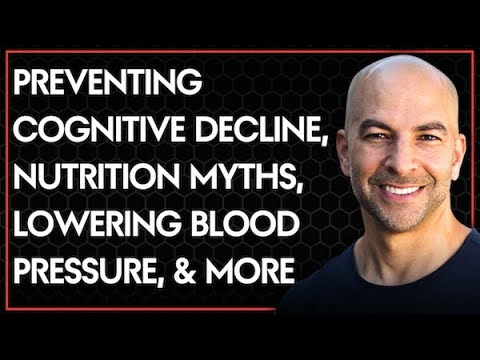In this “Ask Me Anything” (AMA) episode, Peter provides insights on a broad range of important topics. He delves into the prevention of cognitive decline, the link between cardiovascular disease and Alzheimer’s disease, and methods to lower blood glucose, insulin, and apoB. He also addresses nutrition-related queries, exploring the impact of dietary habits on weight loss and longevity, how a person can identify the best diet for themselves, and common nutrition myths. Additional discussions include optimal blood pressure, daily step goals, the benefits of standing versus sitting desks, and much more.
If you’re not a subscriber and listening on a podcast player, you’ll only be able to hear a preview of the AMA. If you’re a subscriber, you can now listen to this full episode on your private RSS feed or on our website at the AMA #60 show notes page. If you are not a subscriber, you can learn more about the subscriber benefits here.
We discuss:
- Overview of topics and episode format [1:40];
- Preventing cognitive decline [5:00];
- How to lower blood glucose and insulin [13:30];
- The relationship between lipids, CVD, and Alzheimer’s disease, and whether statins can increase the risk of neurodegenerative disorders and AD [23:15];
- Reducing apoB levels through exercise and diet [31:45];
- Pharmacological options for lowering apoB [38:00];
- How nutrition impacts longevity via metabolic health, muscle mass, BMD and more [40:15];
- How can someone determine the best diet for themselves? [43:45];
- Nutrition myth: All weight loss is good [46:45];
- Nutrition myth: Metabolic rates are dramatically different among individuals based on genetics [49:00];
- Nutrition myth: Losing weight after a brief period of overeating is impossible [53:45];
- Nutrition myth: GLP-1 agonists are a replacement for a healthy lifestyle [57:45];
- Nutrition myth: There is a single best diet for weight loss [1:03:00];
- Nutrition oversimplification: All calories are created equal [1:05:45];
- Daily step goals [1:06:45];
- The benefits of standing versus sitting throughout the day [1:10:45];
- How to identify the most impactful and easiest-to-implement ways to improve your health [1:12:30];
- The critical importance of emotional health [1:14:30];
- Why supplements should be considered as supportive aids rather than primary solutions in one’s strategy to improve longevity [1:18:00];
- Strategies for reducing high blood pressure [1:20:45];
- Peter’s biggest frustrations with “mainstream health advice” [1:28:00];
- Peter’s chaotic, yet cherished, morning routine [1:31:00]; and
- More.
Get Peter’s expertise in your inbox 100% free.
Sign up to receive An Introductory Guide to Longevity by Peter Attia, weekly longevity-focused articles, and new podcast announcements.
Overview of topics and episode format [1:40]
- Today’s AMA will be in a rapid-fire Q&A style, different from the usual deep dives.
- Previous rapid-fire AMAs have been well-received.
- This format allows covering a variety of topics and questions more broadly.
- Answers will be more conversational, similar to how Peter would speak to a patient.
- Topics include:
- Preventing cognitive decline
- Various nutrition questions
- Relationship between cardiovascular disease and Alzheimer’s disease
- Weight loss and longevity
- Fasting
- Blood pressure
- Step requirements
- And more.
- Peter has recently shifted his in-person presentations from a lecture format to a Q&A format and has found it a better style for the listeners
- He believes a well-moderated Q&A is generally more engaging for the audience.
Preventing cognitive decline [5:00]
If someone came to Peter and said, “What’s the best thing I can do? How can I prevent cognitive decline in my life,” what would Peter say to them?
- Well, there is a “playbook” of modifiable behaviors that one can do to reduce your risk of dementia and prevent cognitive decline
- That said, genetics does play a role in cognitive decline (e.g., APOE4 gene and probably others we’re not yet aware of)
- Outside of that, what can you do with respect to your behavior to reduce the risk?
- The overlap between reducing the risk of a disease known as dementia is virtually identical to the steps you take to reduce the risk of cognitive decline
- Are there differences? Sure there are
- If you’re talking about patients in whom we’re trying to reduce the risk of dementia, and for example, we see serum markers of low amounts of amyloid accumulation, we may actually turn to pharmaceutical agents that reduce the amount of amyloid there
- So that’s something that wouldn’t be in the playbook.
Let’s now talk about cognitive decline in the NON-pathologic sense
Three most important things:
Exercise
- Exercise is the most powerful in terms of magnitude, effect size, and the preservation of cognitive function
- Both strength training and cardio are essential — it’s not an either/or situation
⇒ See AMA #46 all about brain health
Metabolic health
- The brain, this tiny organ, is roughly 2% of your body weight and yet approximately 20% of your metabolic demand
- if you think about that enormous asymmetry, it tells you that anything that plays a role in fuel partitioning and energetics is going to have an outsized impact on your brain
- And all of that points towards having remarkable fuel partitioning, being very insulin sensitive and being very metabolically flexible
- If you dispose of glucose very efficiently, you are by definition very metabolically flexible, which means you are able to access as substrate both fatty acid and glucose for ATP production
- the most obvious example of this is if you look at people at the far end of the spectrum in terms of metabolic inflexibility, we see that in the disease state of type two diabetes and in people with type two diabetes, the increase in the risk for Alzheimer’s disease, depending on where you look, could be anywhere from 40 to even 100%
- “And the good news is those go hand in hand. Exercise is one of the most important tools to increase metabolic flexibility.” says Peter
Sleep
- The epidemiology would suggest that if an individual is not sleeping in appropriate length or stages, their increase in Alzheimer’s disease specifically, but probably in other forms of dementia, also goes up
- Sleep is not a passive thing, it’s an active form of recovery for the brain
Cognitive activities
- So after those three things, the next most important thing is what you actually do with your brain and body
- Engage in complex activities that combine brain and body (e.g., dancing, learning new skills).
- More beneficial than simpler mental exercises like crossword puzzles.
- Practical examples:
- Peter’s father, at almost 87 years old, still works daily, which keeps his brain active and sharp.
- Peter likes driving (like his F1 simulator) because driving is one of those things that involves so many senses, so your eyes, your ears, and your proprioceptive vestibular system
Peter on “retirement” from work
“We should think about retiring as a time when we don’t work for money anymore. But I really think it’s probably important that people are working throughout their entire lives, meaning they’re working on something that is keeping their brain challenged.” —Peter Attia
Supplements
- Supplements exist but are less impactful compared to exercise, metabolic health, and sleep.
- The mentioned lifestyle factors have a significantly much larger effect on preventing cognitive decline.
How to lower blood glucose and insulin [13:30]
If someone gets blood work and they see that their glucose and/or insulin is high, what should they do about it?
{end of show notes preview}
Would you like access to extensive show notes and references for this podcast (and more)?
Check out this post to see an example of what the substantial show notes look like. Become a member today to get access.




